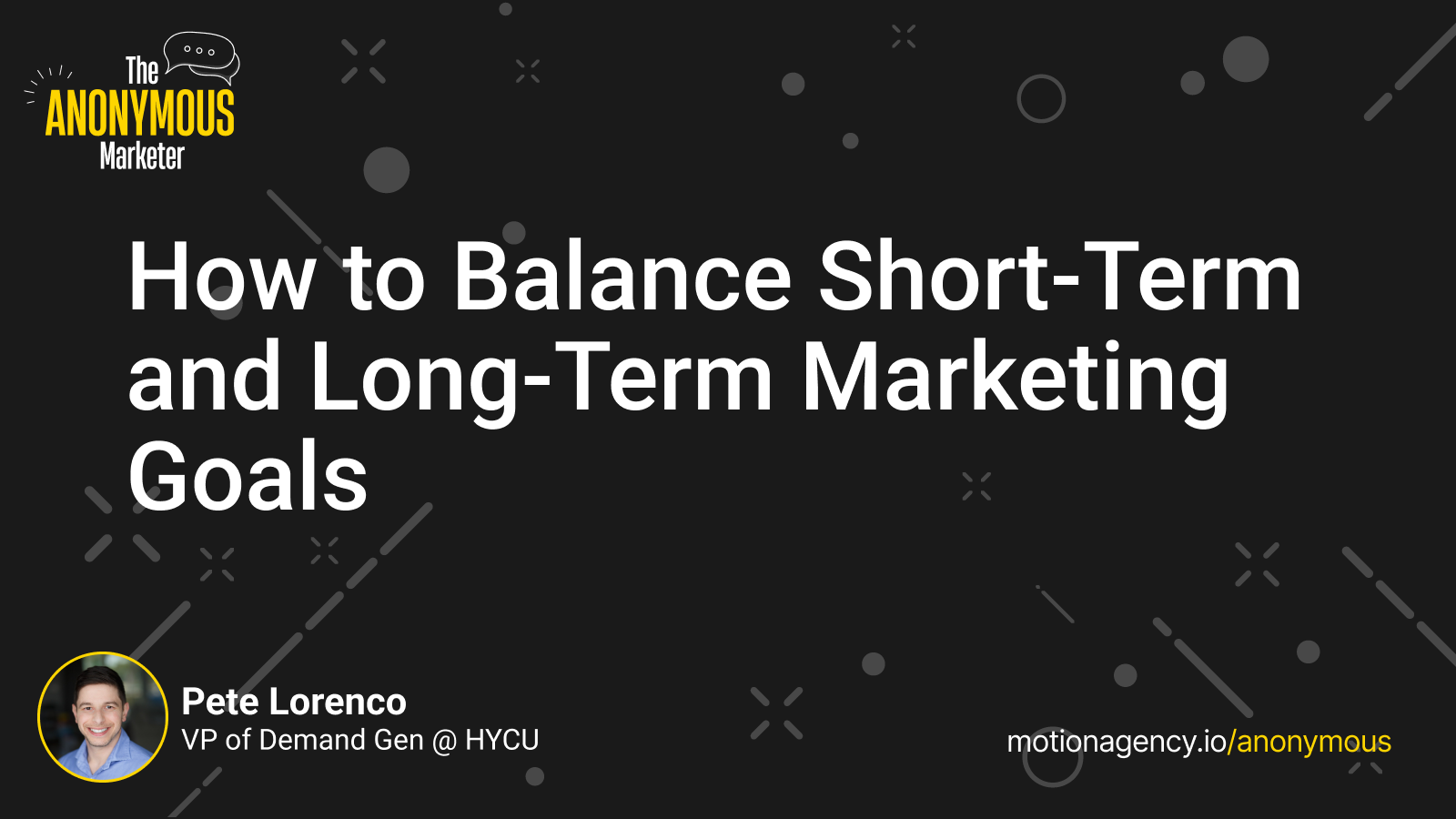Episode Summary
Setting goals is one of the prerequisites for success in marketing. And both short-term and long-term goals are an essential part of your strategy.
But how do you balance short-term and long-term marketing goals?
In this episode of The Anonymous Marketer podcast, our host Nick Bennett welcomes Pete Lorenco, the VP of Demand Generation at HYCU. They share their thoughts on executing short wins, the importance of building credibility, and how to develop your marketing hypotheses for the long-term.
Guest Profile

- Name: Pete Lorenco
- What he does: He's the VP of Demand Generation at HYCU.
- Company: HYCU
- Noteworthy: Pete is also the co-host of the video podcast series, Real ABM. He previously served as the VP of Marketing at Avid and held marketing roles at Iron Mountain and EMC.
Key Insights
- Execute short wins. There's great power in short wins in marketing. Not only does it help boost team morale, but it also builds credibility and trust. Pete explains why short wins are important. He says, "I think most importantly, first and foremost, executing short wins is important. Whether you're a new hire, whether you recently started, like you and I did in our roles, or you've been in a role for six months or a year plus, figuring out the short-term things you can do to increase lead flow always, from my perspective, is the first and most important thing because that builds momentum, that builds credibility, that helps you get points on the board."
- Balance short-term and long-term strategies. Both short-term and long-term goals are important in marketing. So, you need to find a way to balance them. Pete says, "For balancing long-term, as you're getting those wins, as you're increasing leads, as you're starting to get traction, that is where I would build a business case for, 'Hey, our hypothesis if we go invest in a podcast, or if we go invest in doing community stuff or whatever it might be that you're thinking, doesn't mean you stop doing those short-term plays or those short-term hypotheses, but now you're starting to supplement it with longer-term strategies.'"
- Always build trust and credibility first. Credibility is key. To build credibility and trust, you need to be committed and a team player. Then, you can start building your hypothesis on the side and present your results to the board. Pete explains, "For me, I would summarize it by, first and foremost, I would absolutely, positively, a hundred percent focus on delivering and building some trust with that board by measuring those things and achieving what they're asking me to. And I would just try to get some confirmation on both sides of what's a reasonable timeline."
Episode Highlights
Let your results speak for you
“You can still have a long-term goal and hypothesis of the things you want to do, and there could be ways, whether it’s these video shorts and you commit to doing five, and you run a test, but you treat it as a long-term big bet you want to do, but you figure out a way to cut it into maybe a short-term experiment, get learnings, and help justify doing it long-term. You’ve given me ideas that I can probably potentially go implement myself, but I think I would wrap it up by saying, ‘Ultimately, get the wins first.'”
Build your hypothesis on the side
“I would either start to build my own hypothesis on the side — in terms of measurements or things I need to go do — and I would start to figure out when I can present those and what my hypothesis would be if we executed those strategies, if we shifted from web visit, page view, social follower kind of KPIs to qualified leads, qualified pipeline, whatever it might be. Same thing for, like, tactics.”
Seek to understand
“One of the ideas which I myself probably could benefit from putting more into practice as well is, ‘Seek to understand if you’re unsure.’ So if you’re being told, ‘Go do website visits or page views or social follows,’ like those are the metrics that they really want you to focus on. If you’re unsure why, ask questions, dig deeper into why they think those metrics matter most. I think it would be very telling what those things are, and it might help inform future hypotheses or ways you think about presenting your story in the future.”




